BBCSO/Davis/Batiashvili review – clarity, lyricism and ecstatic colours

The programme for Andrew Davis’s concert with the BBC Symphony Orchestra consisted of three 20th-century works of quite extraordinary beauty. Szymanowski’s First Violin Concerto and a suite from Debussy’s Pelléas et Mélisande, arranged by the French conductor Alain Altinoglu, came after the interval. The opening work, however, was The Rose Lake, Michael Tippett’s “song without words for orchestra”, his last major score, completed in 1993 when he was 88.
Inspired by a visit in 1990 to Lake Retba in Senegal, the waters of which look pink in the sunlight, it’s the work of a man calmly reflecting on the grandeur of the natural world and its mutability, even as life approaches its end. It’s also a piece that to some extent demands to be seen as well as heard, since Tippett deploys some 40 rototom drums spanning the platform in a line behind the main body of the orchestra, forcing two of his percussionists into almost balletic motion throughout. Davis carefully probed the score’s shifting sonorities in an interpretation that sometimes emphasised its lyricism at the expense of its momentum. And the BBCSO drummers were mesmerising to watch as they darted back and forth between their instruments.

Careful probing … Andrew Davis.Photograph: Hiroyuki Ito/Getty Images
Hearing Szymanowski’s concerto in close proximity to Tippett is to be reminded of the preoccupation with almost kaleidoscopic orchestral colour that both composers share. Lisa Batiashvili was the breathtaking soloist, spinning out Szymanowski’s long, ecstatic lines with wonderful sweetness of tone and exquisite finesse. Davis’s understanding of the ebb and flow of this music is marvellously acute, and the orchestral sound balanced opulence with great clarity.
Altinoglu’s concert digest of Pelléas, meanwhile, was strikingly effective. The big interludes in Acts I and IV form its structural backbone, though Altinoglu also draws on the opera’s opening and closing scenes, and the bitter colloquy between Pelléas and Golaud in the castle vaults. You miss the voices in places, particularly Arkel’s heartbreaking comments on the mysterious fragility of human nature at the close, though you’re also left marvelling yet again at the greatness of Debussy’s orchestration and the work’s extraordinary balance between beauty and unease.

 Yahoo News
Yahoo News 
